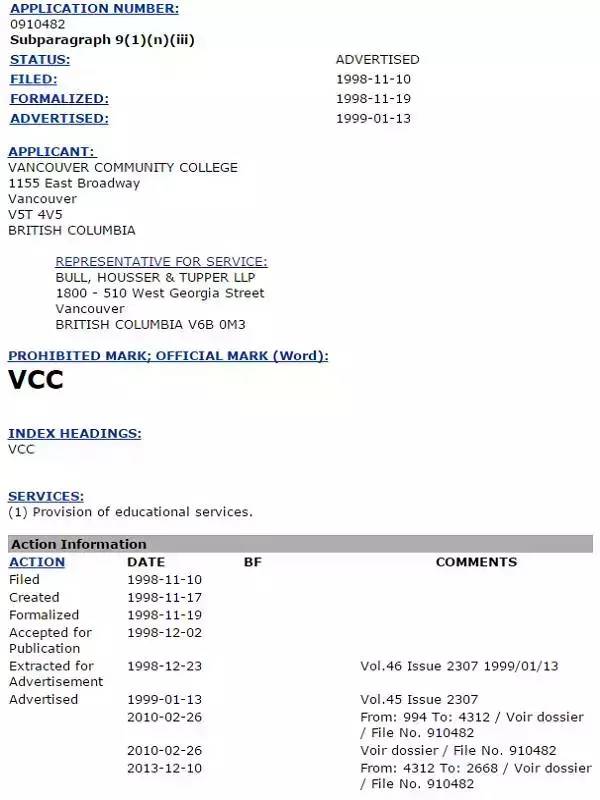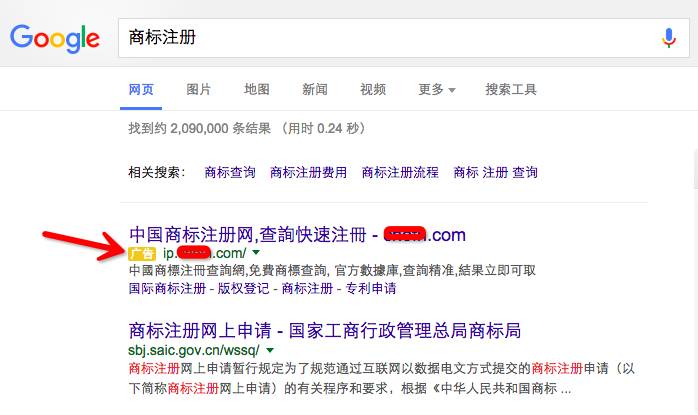The use of a competitor's trademark as a keyword advertisement does not constitute infringement (a Canadian court has ruled)
The title of the original text | Trademarks may make for a better innovation index in China
Author of the original text | L.E. Trent Horne
Translation. | Old high
Proofreading. | Lao Gao Google Translate
The source of the translation | jdsupra.com
The use of a competitor's trademark as a keyword advertisement does not constitute infringement (Canadian court decision)

The Supreme Court of British Columbia, Canada, has ruled that the use of a competitor's trademark in Google AdWords does not constitute infringement.
Trademark infringement lawsuits at Vancouver Community College and Vancouver Career College. Vancouver Community College said the use of VCC as a keyword in Google ads violated VCC, a registered trademark of Vancouver Community College. VCC is a registered trademark of Vancouver Community College in Canada.

Screenshot of The Canadian Registered Trademark Information at Vancouver Community College (Source: Canadian Trademark Database)
AdWords is an online advertising program offered by Google that allows advertisers to purchase certain keywords. When users search Google using the keywords for ads, ads next to Google search results may appear. Keywords can also trigger a publicity display on other sites affiliated with Google AdWords on the Internet. By purchasing keywords, when a user searches for "VCC," Vancouver Vocational College ranks higher than Vancouver Community College in some Google search results.

Google AdWords search performance
In deciding whether it would create the possibility of consumer confusion, the court held that the search for a "first impression" of the population was the primary key to deciding whether to constitute confusion. The court found that "first impression" was the key to completing first impressions only when the searcher clicked into a website, i.e. clicking on search results and opening the site. In addition, in the case of Vancouver Community College and Vancouver Vocational College, in fact, Vancouver Vocational College's website does not mention Vancouver Community College. Judging from the content of the defendant's website and the requirement that the students attend classes in person, there is no possibility of confusion about the trademarks involved.
The decision is consistent with the April 2015 decision of the Federal Court of Canada on whether the use of another person's trademark as a label constitutes trademark infringement. In a lawsuit filed by two travel services, Red Label Vacations and 411 Travel Buys, the Federal Court of Canada found that the use of competitor trademarks in Meta tags was intended only to improve a company's ranking in search results, to provide consumers with alternative connections, and not to direct searchers to specific competitor websites. While search engine ad rankings may affect the site's click-through rate, the choice is ultimately in the hands of searchers. Even searchers looking for familiar sites, reaching a competitor's website through a link, cannot conclude that it is really misleading, and that the source of the goods or services that need to be considered is necessarily confusing. In other words, if there is no possibility of confusion as to the source of goods or services on the website, it does not constitute trademark infringement.
Two cases from Vancouver Community College and Red Label Vacations also remind consumers to carefully navigate and think about the content of the site before making a purchase decision, rather than relying solely on ranking the results of the search.
Although the use of competitor trademarks in Google AdWords and metatags may not constitute trademark infringement, it is not possible to act recklessly, and the content of the Site will remain an important factor in the ongoing attention required by such litigation, and consumers may still be sued if they misappropriation of more original content from other people's websites, or use other people's trademarks to mislead consumers into consumption.
Old High Review: Creativity is the most important thing. Originality is the most important thing. The use of trademarks in advertising should be paid special attention to after the implementation of the new Advertising Law on September 1. Network advertising, similar to this case of advertising behavior is a lot, in the country also heard from time to time. For example, Lao Gao familiar with titanium media (China's most cattle technology blog), in the app store for a period of time as long as you search for "titanium media" three words, the number one is a little-known media app.
Professional advisory unit: Wanwen Intellectual Property Management Agency
This article is Lao Gao translation, reprint please indicate the source of the translator, reprint please indicate the following information at the end of the text:
Wen/Gao Jinrong, Wanwen Intellectual Property Employees, Intellectual Property Observers, Agents, Enthusiasts, Titanium Media 2014 Top 10 Authors, Ari, IPRdaily, etc. Trademark Column Writing; WeChat: aogo66
Go to "Discovery" - "Take a look" browse "Friends are watching"